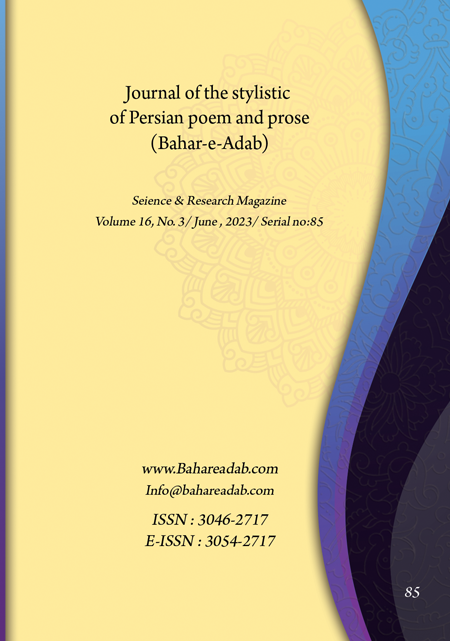- Count View : 524
- آدرس کوتاه شده مقاله: https://bahareadab.com/article_id/1466
- کد DOI مقاله: DOI:10.22034/bahareadab.2023 .16 .6874
Journal of the stylistic of Persian poem and prose
volume Number 16،
number In Volume 3،
،
issue Number 85
The analysis of Positive Lexical Bundles in Divan-e Shams-e Tabrizi
Parvindokht Rezaei Majdabadi , Hossein Parsaei (Author in Charge)
Abstract
BACKGROUND AND OBJECTIVES: Divan Shams is a reflection of the opinions and thoughts of this mystic, many of its words have a positive meaning in both axes of companionship and substitution, and like a chain, it serves the thoughts of its creator, as one of the famous western psychologists, Martin Seligman He has turned himself from the symptoms of learned helplessness to the penetrating effects of positive emotions. The purpose of this essay is to analyze and analyze Ghazals and investigate the positive lexical chains of Rumi in Divan Shams according to Martin Seligman"s theory of positivist psychology.
METHODOLOGY: The current research is a basic research using the methods of rational reasoning and analysis and based on library studies, and it deals with the category of analysis of chains of positive words based on the positivist components of Martin Seligman and its effect on Diwan Shams of Tabrizi. The statistical community is also the statistical community of 3000 verses from the ten-volume book "Koliat Shams" by Maulana Jalaluddin Mohammad Molavi, based on the original edition of Faruzanfar with his corrections and margins.
FINDINGS: All the components of Martin Seligman"s positivist psychology have been observed in Koliat Shams. The percentage of Seligman"s positive virtues in Diwan Shams is as follows: excellence has taken the first rank of virtues with 42.43%. Wisdom is in the second place with 20.61%. Shujaat ranks third with 17.28%. Altruism with 14.10%, moderation with 4.62% and seeking justice with 0.96% have taken the next ranks. The abilities of love with 74.54%, leadership with 65.38% and perfection with 53.96% are the highest, and the abilities of humor with 0.78%, seeking justice with 0.96% and stability with 7.92% are the lowest.
CONCLUSION: The use of such positive concepts and words in Diwan Shams, in addition to bringing the audience to the city of Rumi"s love, is effective in creating psychological transformation and changing attitudes and improving the quality of life of the audience. The adaptation of Rumi"s positive linguistic and intellectual elements in Divan Shams with the opinions of Martin Seligman; Today"s psychologist and psychotherapist, these two spiritual and human capitals, with a gap of eight centuries, are the main result and product of this research. Seligman"s thoughts and components as the subject and the brain-made world of Rumi in Divan Shams, as the example and the compass hand of the sublime human life, have created a wonderful and irreplaceable alliance that is reliable and fruitful from the two scientific and artistic points of view of literature and psychology.
Keyword
Rumi
, Divan Shams
, Martin Seligman
, positive psychology.
- Al osfour, M. (2006). “The perfect human being and Molana's anthropology”. Research paper of Yazd University. 7 (12), pp. 127-95.
- Angla.L, et. al. (2004). positive psychology in clinical practice. published onlin review in advance on December 17.
- Argyle, M. (2003). Psychology of happiness, translated by Fatemeh Bahrami and others, Isfahan: Jihad University, p.98.
- Franklin, S. (2011). The psychology of happiness, translated by Alireza Sohrabi and Faramarz Sohrabi. Tehran: Pendar Taban, p. 37.
- Frederickson, B. (2015). Positivism, translated by Nasrin Parsa, Tehran: Javane Rushd, pp. 46-49.
- Kaviani M. & Mousavi, S.s. (2010). “Psychological analysis of Molavi's point of view on altruism. Allameh magazine”. 10 (26), pp. 126-97.
- Molavi, J. M. (1999). Koliat Shams or Divan Kabir, with corrections and margins of Badi al-Zaman Forozanfar, ten volumes, Tehran: Amirkabir.
- Mousavi, S. A. & et. al. (2010). “The effectiveness of teaching self-discipline skills on the happiness of female high school students”. Women's Psychological Social Studies Journal. 8 (4), pp. 103-120
- Seligman, M. & Pterson, C. (2005). “psychology progress, empirical validation of interventions”. The American Psychological Association, 60 (5), PP.410-421.
- Seligman, M. (2018). inner happiness Translated by Mustafa Tabrizi and others, Tehran: Danje.
- Seligman, M. (2020). The flourishing of positivist psychology, translated by Amir Kamkar and Sakineh Hejbarian, Tehran: Ravan.
- Shari’atmadari, A. (2019). Educational psychology, Tehran: International Publishing Company, p. 409.

